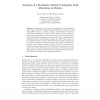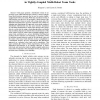24 search results - page 1 / 5 » Analysis of a Stochastic Model of Adaptive Task Allocation i... |
ATAL
2004
Springer
13 years 10 months ago
2004
Springer
Adaptation is an essential requirement for self–organizing multi–agent systems functioning in unknown dynamic environments. Adaptation allows agents, e.g., robots, to change th...
CP
2007
Springer
13 years 10 months ago
2007
Springer
The increasing levels of system integration in Multi-Processor System-on-Chips (MPSoCs) emphasize the need for new design flows for efficient mapping of multi-task applications o...
ICRA
2009
IEEE
13 years 11 months ago
2009
IEEE
— This paper presents a distributed version of our previous work, called SAFDetection, which is a sensor analysisbased fault detection approach that is used to monitor tightlycou...
ICRA
2009
IEEE
13 years 11 months ago
2009
IEEE
— We present a decentralized, scalable approach to assembling a group of heterogeneous parts into different products using a swarm of robots. While the assembly plans are predete...
CEC
2010
IEEE
13 years 4 months ago
2010
IEEE
— This work is the first attempt to investigate the neural dynamics of a simulated robotic agent engaged in minimally cognitive tasks by employing evolved instances of the Kuram...


